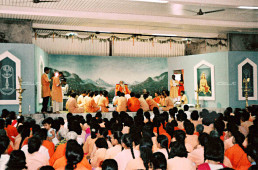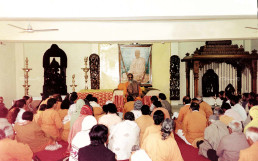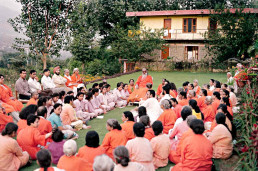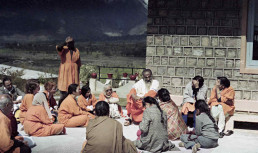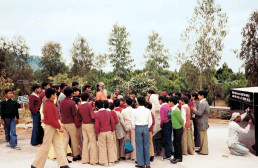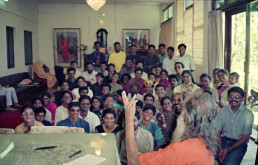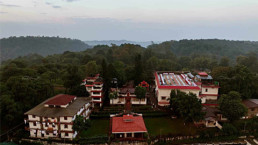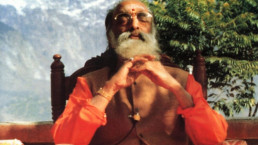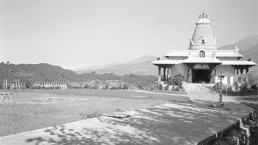Sidhbari is synonymous with Pujya Gurudev’s unforgettable spiritual camps. Pujya Gurudev would say: “It is absolutely necessary for spiritual Sadhaks to dry-dock to a quiet place like Sidhbari and listen to the spiritual Masters, deeply reflect on them, and lift the mind in contemplation on the Reality.”
The life force in Chinmaya Tapovan ashram is Vedanta. While Sandeepany HIM is the site for the two and a half years full-time Vedanta courses for enrolled students, Pujya Gurudev opened up the gates of the Sidhbari ashram to share the inspiring scriptures with people from all walks of life. So, Sidhbari is synonymous with the unforgettable camps that Pujya Gurudev first started which the Chinmaya Guru Paramapara continues.
In 1981, the inaugural year of the ashram, Pujya Gurudev invited the world to experience the bliss of the first camp at Sidhbari with Vivekachoodamani, the poetic Vedantic composition of Bhagavan Adi Shankaracharya. From Sep.4th – Oct.28th, 1981, Pujya Gurudev taught the exquisite text of 581 verses in five historic camps where he took the blessed audience to the enthralling heights of Vedanta.
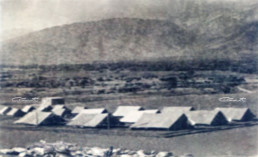
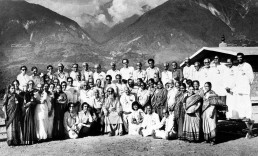
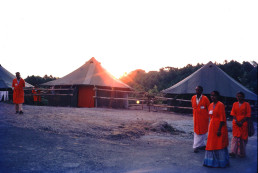
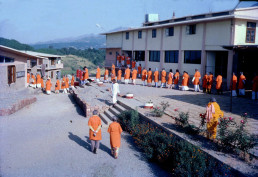
It was the time when Sidhbari was hardly known, and the amenities in the ashram were the bare essentials. There were hardly any cottages or even beds. Yet, the sheer power of Gurudev’s discourses and the exalted subject matter swept everyone off their feet into a realm beyond physical wants.
Those first five camps were a magical penance with a routine that reined in the wandering senses and redefined time. Pujya Gurudev encouraged all to use the spiritual retreat as a time to embark on a single-pointed quest for the Highest. It was a time for temporary sannyas – to renounce the noisy wants of the world and step into the silence of the Self.
The 5 am meditation sessions with Gurudev were blissful. The eloquent brilliance of Gurudev’s examples in his daily discourses at 6:30 am and 7:30 pm had the audience spellbound. Gurudev directed delegates to walk in solitude through the pine forest for some time in the day to introspect in deep silence. The discussions and question-answer sessions with Brahmachari Vivek Chaitanya, the first Acharya of Sandeepany Himalayas, increased understanding. The evening satsangs in the ethereal dusk of Sidhbari uplifted all to the peaks of reflective stillness.
While the intellect was steered toward clarity, the heart was softened to experience the purity of devotion. The collective Vishnu Sahasranama Archana and the trip to the stream to offer the flower petals after the puja made hearts soar and sing with divine joy. The Paada pujas offered to Pujya Gurudev’s holy Feet were full of reverence.
The fragrance of knowledge and devotion also came through in the routine of those camps when all attendees could assist and volunteer in different ways during the days.
There were other special events that made these early camps stand out even more. The Dalai Lama visited Chinmaya Tapovan for a special satsang on October 3rd, 1981 during the third camp.
Oct.27th, 1981, during the fifth camp, Pujya Gurudev consecrated the very special idols of Sri Kirata Murti Shiva and Parvati along with Lord Ganesha in an intricately carved Mandap inside the Satsang Hall. He narrated the story of Arjuna being blessed with the Pashupataastra after Shiva, in a hunter’s guise, tested and wiped out Arjuna’s arrogance. Arjuna learned the importance of humility and complete surrender.
Even today, those reigning idols inside the Satsang Hall are Pujya Gurudev’s reminder to us about the importance of surrendering our vasanas during satsang.
When the final camp of the first Vivekachoodamani series concluded on Oct.28th, 1981, Gurudev conducted the landmark convocation ceremony, a tradition he had started since the first camp. Pujya Gurudev applied the chandana tilaka to bless each attendee and gave a certificate to recognize the completion of the verses in that session. Then, each attendee carried a lamp lit from the Akhanda Jyoti at Swami Tapovan Maharaj’s altar and placed it on their home-states on a map of Bharat. With that unique ritual, Pujya Gurudev emphasized the importance of each seeker spreading the light of knowledge in their hometowns.
Pujya Gurudev conducted about 43 camps in Sidhbari expounding on a vast range of introductory and Upanishadic texts. In several of the camps, Brahmachari Vivek Chaitanya melted hearts with his discourses on Tulsi Ramayana, sweetening the flowing Knowledge with nectarine devotion.
After those iconic camps of 1981, the flow of Knowledge, Jnana Ganga, from Sidhbari was incessant. Pujya Gurudev called the spiritual camps as a port for spiritual dry-docking. He said: “‘You all have come here for dry-docking, It is a must for spiritual Sadhaks. The ships, after a few voyages in the ocean, are dry-docked for a complete rehauling and repairs. It is absolutely necessary for spiritual Sadhaks to dry-dock to a quiet place like Siddhabari and listen to the spiritual Masters, deeply reflect on them and lift the mind in contemplation on the Reality. This constant listening, thinking and contemplating helps the corroded mind to drop all its dross that it gathered during its sojourn in the ocean of Samsaar. A mind thus repaired and properly tuned up, can expand and lift itself to a state of Pure Awareness and Bliss.”
Chinmaya Tapovan Sidhbari is truly a vibrant spiritual port. Throughout the years, many Swamis and Acharyas ferry their devotees from all over the world to ‘dock’ in the soothing serenity of Sidhbari. Spiritual camps in Hindi, English, and the regional Indian languages are conducted regularly, and the camp routine that Pujya Gurudev initiated is still implemented. Meditation, daily discourses, discussions, Q&A sessions, seva opportunities, bhajans, and the famous treks in the pine forests are key attractions. Pujya Gurudev’s Paduka Puja is a worshipful experience. And, the field trips to the Gaushala and CORD premises are cherished by all.
The camps also reach out to a varied audience. Chinmaya Tapovan Trust graciously hosts yearly CHYK camps, management camps, educational trips from Chinmaya Vidyalayas and colleges. The complete experience in Sidhbari is an uplifting, continuous blessing.
Spiritual Camp Videos
Camp attendees placed lamps on their home states after camps in the early years.
Paada Puja offered by the sisters of Pujya Gurudev
Pujya Gurudev used to distribute Prasada in a loving way after Paada puja.
Pujya Gurudev's powerful explanation of Sat-Chit-Ananda during a camp in Sidhbari
Pujya Gurudev enjoying a Malayalam bhajan before a bhiksha in Sidhbari
Pujya Gurudev enjoying a Pahadi bhajan
Navigation
Next Topic
The Progress at Sidhbari
When we visit Sidhbari today, it is hard to imagine the unapproachable land that it was in the 1970s. Swami Chinmayananda’s vision made that metamorphosis in…
Home Page
Sidhbari Ashram
Chinmaya Tapovan ashram in Sidhbari shines as the crest-jewel of Chinmaya Mission where the Grace of the Guru awakens the thirst for Knowledge ripened with devotion.
Previous Topic
Ram Mandir
The presence of a devotee draws the Lord without fail. Once Veera Hanuman took up his abode in Sidhbari, His beloved Lord Rama also had to come there.
